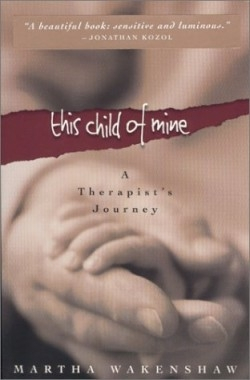This Child of Mine
A Therapist's Journey
Sigmund Freud and other therapists have written case histories as gripping as fine short stories. Add to that list Martha Wakenshaw, a mental health counselor in Seattle, who is more compassionate and less theoretical than Freud, but probably better at helping. She works with abused and neglected children, and addresses failed parenting and the holes in society’s safety net.
Her narrative lifts what could be a litany of grief into a buoyant song of hope. To the grim cases (disguised to protect identities) she brings energy, understanding, and poetic grace. “Shelly’s eyes are all iris, muddy brown. It seems like there are no defining pupils. She has sour breath made from the ashes of worry.”
That Wakenshaw has won honors as a poet comes as no surprise. She enters the mind of a four-year-old boy or a teenaged girl and reports back, convincingly. Unlike many therapists, she communicates what she understands in language that a child can grasp, shares insights with uneducated parents, and contends with keepers of the system. “When you get involved with the system, be prepared to die. The system for protecting children is inexact, imperfect, and in the end, everyone becomes a victim.”
The book consists of some twenty cases interspersed with the author’s feelings, reflections, and contemporary notes, all gently organized into vignettes that hover between heartbreaking and heartening.
Fighting burnout, wondering where to find her motivation to do this work, Wakenshaw takes us back to her family, including a mentally ill brother who abused her, to her own therapy, to her hairdresser, her yoga class, to her husband and children. Sensitive and sensual, the author reveals herself intimately yet discreetly: no grandstanding, coyness, or indecent exposure.
Plunging into crass indignity just to get close to “her” children, she comes out dignified, having touched them as no one else ever has. Scorning the recent turn toward drugs for calming children, she offers a fresh diagnosis: Parental Attention Deficit.
This is not just clinical work, it is social commentary raised to the level of literature, explaining much about those “senseless” crimes the big media love to report.
Reviewed by
E. James Lieberman
Disclosure: This article is not an endorsement, but a review. The publisher of this book provided free copies of the book to have their book reviewed by a professional reviewer. No fee was paid by the publisher for this review. Foreword Reviews only recommends books that we love. Foreword Magazine, Inc. is disclosing this in accordance with the Federal Trade Commission’s 16 CFR, Part 255.

